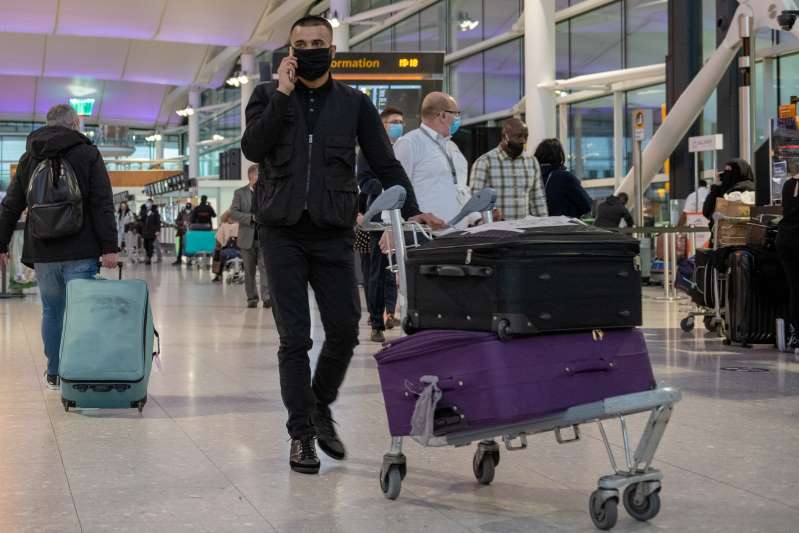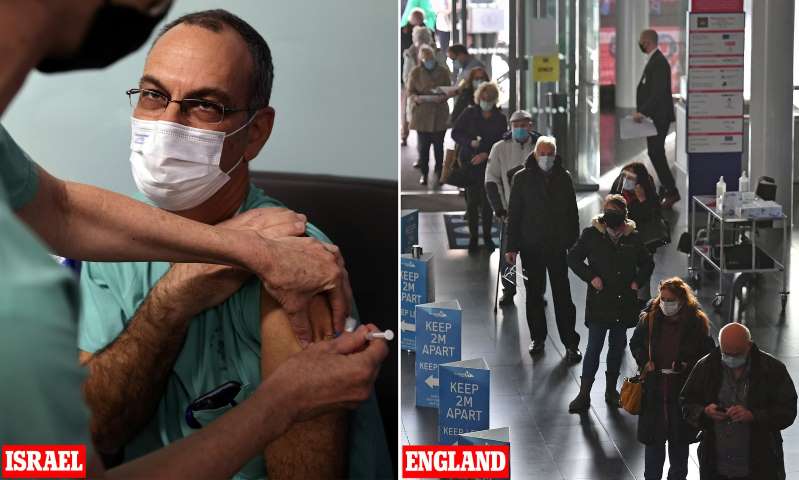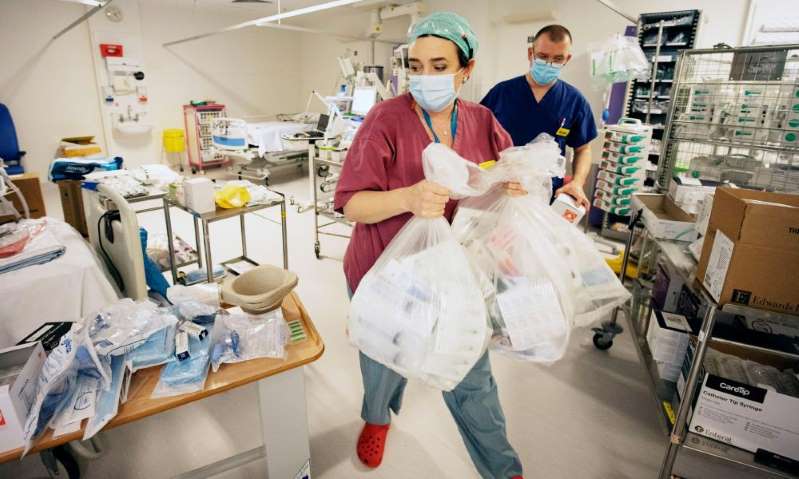Covid: Britons arriving from UAE must self-isolate after travel corridor removed










Covid: Britons arriving from UAE must self-isolate after travel corridor removed
Thousands of British holidaymakers currently in Dubai and the other emirates of the UAE will have to self-isolate on return. The Gulf state has been removed from the "travel corridors” list that gives exemption from quarantine to arrivals in the UK. It follows what government sources call "a significant acceleration" in coronavirus cases imported to the UK from Dubai.

Anyone arriving after 4am on Tuesday 12 January must self-isolate for 10 days – though people living in England can take a Covid test after five days and, if it is negative, end quarantine.
The Foreign Office now warns against “all but essential travel to the UAE, based on the current assessment of Covid-19 risks”.
The transport secretary, Grant Shapps, tweeted: “We need to immediately remove the UAE from the travel corridor list.”
The announcement was made shortly before 8pm UK time, making it impossible for anyone in the UAE to return before the deadline.
Reference: Independent: Simon Calder
Israel shames Britain with round-the-clock vaccination programme










Israel shames Britain with round-the-clock vaccination programme
Israel is continuing to shame Britain and the rest of the world with its 24/7 vaccination programme as it now begins innoculating people as young as 55.
The Middle Eastern country has raced ahead by squeezing every last dose out of its vaccine supplies and using its efficient health system to launch a round-the-clock immunisation drive with military help.
But in Britain, a vaccine shortage is being blamed for the slow rollout of the jabs, despite new hubs which hope to administer an injection every 45 seconds.
Vaccines minister Nadhim Zahawi said it could take place 24 hours a day 'if we need to', but only when there are high enough levels of the jabs. Israel, meanwhile, has had a new shipment of doses arriving today and is yet to suffer a major shortage.
Zahawi said elderly Britons are unlikely to want an appointment in the middle of the night, meaning the current opening hours will continue to be 8am to 8pm.
But in Israel, many vaccination hubs are open at all hours, even on Shabbat, with the at-risk up groups able to book a time slot to their choosing via an app, on the phone or through a website.
But many younger people not in high-risk groups have still managed to get vaccines.
Though they are not scheduled to receive the injections for a number of weeks while they wait for priority groups, young people have made the most of the the 24-hour system.

Some have simply wandered in at night without a booking when the centres are less busy, making use of the vaccines which have been taken out of the fridge and need to either be used or thrown away.
They can also book times when there is a lull in priority groups filling the slots, which tend to be later at night, showing the benefits of the round-the-clock service for the wider population.
Israel's relaxed rules about who can turn up for a jab has meant that more than 100,000 people between the ages of 20 and 40 had already been inoculated by last week, many of them without pre-existing conditions.
Pressed on whether vaccines could be administered night and day in Britain, Zahawi told BBC Radio 4's Today programme: 'If we need to go to 24-hour work we will absolutely go 24 hours a day to make sure we vaccinate as quickly as we can.'
But in Israel, people over 60 are already being given their second shots with 72 per cent of them having already received the first jab, with a new shipment of 700,000 new doses arriving in the country.
More than 20 per cent of its 9million population has been vaccinated, compared to only three per cent of the UK despite Boris Johnson being the first world leader to approve the injections.
Only 23 per cent of England's over-80 population has received their first vaccine.
Zahawi said he is trying to learn lessons from Israel where it is taking an average of four minutes to administer each jab.
Speaking about the Israeli example, Mr Zahawi told ITV's Good Morning Britain: 'One of the things we have learned is the speed at which they can actually vaccinate people through the mass vaccination centres.
'We want to make sure that we get to similar speeds of being able to vaccinate through mass vaccination centres.
'They are doing it (at) about four minutes per patient and that's the sort of target we want to make sure we deliver on.

'At this stage it's a race against time. The more vaccine that can get into arms, quicker, the better.'
Israel has succeeded by making early deals with Pfizer/BioNTech Moderna and AstraZeneca since before any of the jabs were approved.
It has also been dividing up its vaccine stocks to get them to remote areas, and some of its health workers have even extracted extra doses from the vials they receive.
Some nurses have managed to increase efficiency by extracting six doses from each vial rather than the advertised five.
The country is prioritising over-60s but also allows the younger generation to be vaccinated if they happen to be outside injection centres at the day they, so that precious vials of the jab do not go to waste.
More than 100,000 Israelis between the ages of 20 and 40 have been vaccinated.
In addition, Israelis have been promised digital 'green passports' allowing them to sidestep certain lockdown rules once they receive both doses.
Health ministry director-general Hezi Levy said that around a fifth of Israel's population would have had both shots by the end of this month.
Prime Minister Benjamin Netanyahu said vaccinating vulnerable cohorts will allow Israel to emerge from the pandemic in February. He is up for reelection in March.
Israel has in parallel tightened a lockdown to rein in a surge in coronavirus cases. Officials say public over-confidence in the vaccines may have led to laxity in other precautions and stoked fresh contagions.
Hospitals worry about being overwhelmed by patients and personnel being more exposed.
'We have quite a rise in the numbers of medical staff which are infected in the last 10 days - an extreme increase - and we are afraid that we'll be short of people,' Chosen said.
A week after the booster, each recipient will be issued with a Health Ministry vaccination certificate providing exemption from quarantine, officials say.
Israel last week received an initial shipment of Moderna Inc vaccines which Netanyahu said would be administered at home to those who cannot come to clinics
A deal with Moderna was signed as far back as June, before the critical Phase III trials had even begun. By contrast, Britain will not get any Moderna shots until the spring.
Pfizer signed a deal for eight million vaccines - enough to cover half the population by themselves - on November 13, only days after announcing its trial results.
The following week, Israel reached an understanding with AstraZeneca for 10million doses of the Oxford jab.
Health minister Edelstein said Israel had been an 'early bird' in negotiating with pharmaceutical firms.
Hospital patients to be sent to hotels to free up beds for critical Covid patients









Hospital patients to be sent to hotels to free up beds for critical Covid patients
Thousands of hospital patients are set to be discharged early to hotels or their own homes in order to free up beds for Covid-19 sufferers needing life-or-death care, the Guardian has learned.
Hospital chiefs in England intend to start discharging patients early on a scale never seen before, as an emergency measure to create “extra emergency contingency capacity” and stop parts of the NHS collapsing, senior sources said.
Documents seen by the Guardian also reveal that the NHS is asking care homes to start accepting Covid patients directly from hospitals and without a recent negative test, as long as they have been in isolation for 14 days and have shown no new symptoms.
Under the “home and hotel” plan, patients discharged early into a hotel will receive help from voluntary organisations such as St John Ambulance and the British Red Cross, armed forces medical personnel and any available NHS staff.
The London Hotel Group (LHG), which owns the Best Western chain, has started taking Covid-positive patients from King’s College Hospital in south London and is looking after them in its hotel in nearby Croydon. It is in talks with 20 other NHS trusts and says it could provide 5,000 beds.
Families will be expected to play a key role in monitoring and caring for loved ones who are sent home days or weeks before they would otherwise have left hospital, with support from health professionals where possible.
The plans come amid growing concern that hospitals will soon be overwhelmed and that the crisis may not peak for several weeks. More than 35,000 Covid patients are in UK hospitals, with that number rising by 6,213 in the last week alone.
NHS leaders fears that the new Covid variant, which has fuelled infection rates in London, south-east and east England, leaving many hospitals struggling to cope, will soon do the same in the south-west and north-west.

Record levels of sickness absence in the health service and its central role in the government’s mass vaccination drive led NHS sources to warn that few staff will have time to deliver significant care at private homes or hotels once patients are discharged.
But they said patients will not be asked to leave hospital early if they are still medically at risk, so they should need mainly light-touch care. “This is for patients who don’t need to be in a hospital bed but still need to be in a protected environment,” said one official.
NHS England, as well as bosses of hospitals under the most extreme pressure, are having detailed discussions about implementing the “home and hotel” option for what a senior NHS source said would involve “thousands” of patients. It is part of their efforts to create “extra emergency contingency capacity” once other options, such as doubling or tripling critical care capacity and using the emergency Nightingale field hospitals, have been exhausted, sources said.
The London Hotel Group (LHG) said its hotels could provide beds for at least 5,000 patients facing early discharge, including 1,500 in London. LHG chief executive Meher Nawab said: “We will be looking to roll this solution out across our hotels to provide hospitals with a lifeline at this critical time.”
An LHG spokesperson added: “The patient group the NHS is seeking to accommodate at this stage are recovered or recovering from Covid and who are medically fit for discharge, and thus do not require specialist medical supervision or specialist care, but can’t yet return home. This frees up NHS bedspace and capacity and is relatively easy for hotels to accommodate.”
But the plan has generated controversy, with patient groups voicing unease about its impact. Lucy Watson, chair of The Patients Association, said: “This is a dire situation, in which the NHS often has no good options available. Discharging patients early from hospital is likely to be one of few options open to the NHS to manage the scale of the current need.
“However, early discharge can often cause problems that result in harm to the patient and the need to re-admit them. Care by volunteers in hotels is not an adequate substitute for proper hospital care. But at a time when hospitals are overwhelmed by critically ill patients and striving to prevent loss of life on a large scale, clearly they will be making desperate choices.”
Dr Charlotte Augst, chief executive of the umbrella group of health charities National Voices, said: “We have questions about where the health and care staff to look after those people will come from and how any deterioration would be dealt with given the very long waits for 111 or 999 services.
“In our view this proposal is indicative of the unpalatable decisions NHS leaders are now forced to make due to the immense pressures placed on the system by this latest lockdown coming yet again too late to protect the NHS’s ability to provide universal high quality services for all.”
Jeremy Hunt, the former health secretary who now chairs the Commons health select committee, warned on Tuesday that the NHS is facing a “triple whammy” of pressures that could leave it dangerously exposed this winter and mean the greatest pressure may not arrive until February.
Chris Hopson, chief executive of NHS Providers, said that would expand capacity but “will also work closely with community services and social care partners to maximise the discharge of medically fit patients”.
Meanwhile, the NHS is asking care homes to start accepting Covid patients directly from hospitals and without a recent Covid test, the Guardian has learned.
The policy had been to send Covid patients to designated “hot” care homes where infection spread could be limited and to prevent a repeat of last spring’s epidemic in care homes, which was partly fuelled by hospital discharges. But a target to set up 500 such homes has been missed, leaving only 2,533 beds available.
An NHS document sent to some care providers says: “We are now advising that for some within this group, it will be appropriate for them to move directly to a care home from hospital … because we now know they do not pose an infection risk to other residents in a care home.”
If clinicians assess a patient has no new Covid symptoms or exposure and has completed their isolation period, they can be discharged straight to a care home without a further Covid test in the 48 hours before discharge, it adds.
The plan sparked concern among care operators who want assurances that anyone coming out of hospital 14 days after a positive test cannot still pass the virus on.
“We have said we need to see strong clinical evidence,” said Nadra Ahmed, executive chairman of the National Care Association which represents independent care operators. “We need to have absolute confidence if someone is coming out of hospital having been Covid-positive that they are no longer infectious.”
Prof Martin Green, chief executive of Care England, which represents private care providers, said: “The key is at the end of the day it is for the care homes to decide and hospitals should not put undue pressure on care homes.”
The Department of Health and Social Care have been approached for comment.
Reference: Denis Campbell and Robert Booth
Government inefficiency risks undermining Covid vaccination programme












Government inefficiency risks undermining Covid vaccination programme
Professor John Bell has stated that the whole country could be vaccinated in five days if the authorities got their act together. Where is the leadership to make this happen?
We have large empty hotels, pharmacies, assembly halls, church halls, community halls and schools, many of which would be ideal to help the mass vaccination programme. So use them. We are now told that seven vaccination centres will be open for 12 hours a day, as if that is wonderful. Sheer madness. The centres should be open 24 hours a day with dedicated public transport to the centres; the elderly vaccinated during the day, younger people vaccinated at night.
We have already been told that Public Health England’s stifling bureaucracy is holding up the vaccination effort. Boris Johnson said last year that it was like being in a war, so take emergency powers, requisition space for vaccination centres and enforce swift action, just as you would in a war.
Far too much talk of “hoping” and “intending” and not enough “doing” will ensure that the programme is, at best, only a partial success.
Glynne Williams
WalthamstowBlame game
I find it rich in the extreme that the government is now putting the blame for increasing Covid infections onto the public, when only three weeks ago that same government relaxed restrictions over Christmas. This despite clear and multiple warnings that the nation would pay for it in increased hospitalisations and deaths in January.
For reasons of short-term popularity they allowed multi-generational families to meet at a time when it was already known that the new variant was up to 70 per cent more transmissible.
Sadly but predictably, blaming someone, anyone, for their own incompetence has proved to be a trademark of this Conservative government.
Arthur Streatfield
Bath
You recently published a report about the Cumberland Infirmary having to send patients to Dumfries and Newcastle as it has become overwhelmed by Covid (News, 6 January).
Last Saturday, as part of my daily exercise, I walked down the road at the end of my street, the A7, and on to the Eden Bridge. I was amazed by the amount of traffic, so amazed I did a count with the stopwatch on my phone. Excluding vans and lorries, there were about 80 cars a minute going over the bridge – where were all these people going?
I couldn’t help comparing that to last April when I was able to walk down the middle of the bridge unhindered. People in Carlisle seem to be unaware of what’s going on in their local hospital. Sadly this is probably fairly typical of what’s going on elsewhere.
Reuters: 1 day ago
Articles - Most Read
- Home
- LIVER DIS-EASE AND GALL BLADDER DIS-EASE
- Contacts
- African Wholistics - Medicines, Machines and Ignorance
- African Wholistics -The Overlooked Revolution
- African Holistics - Seduced by Ignorance and Research
- The Children of the Sun-3
- Kidney Stones-African Holistic Health
- The Serpent and the RainBow-The Jaguar - 2
- PART ONE: DIS-EASE TREATMENT AND HEALTH-3
- 'Tortured' and shackled pupils freed from Nigerian Islamic school
- King Leopold's Ghost - Introduction
- PART ONE: DIS-EASE TREATMENT AND HEALTH-4
- PART ONE: DIS-EASE TREATMENT AND HEALTH-2
- PART ONE: DIS-EASE TREATMENT AND HEALTH-5
- African Wholistics - Medicine
- Menopause
- The Black Pharaohs Nubian Pharaohs of Ancient Egypt
- The Mystery System
- PART ONE: DIS-EASE TREATMENT AND HEALTH-6
Who's On Line?
We have 174 guests and no members online
Ad Agency Remote
Articles - Latest
- The Male G Spot Is Real—and It's the Secret to an Unbelievable Orgasm
- Herbs for Parasitic Infections
- Vaginal Care - From Pubes to Lubes: 8 Ways to Keep Your Vagina Happy
- 5 Negative Side Effects Of Anal Sex
- Your Herbs and Spices Might Contain Arsenic, Cadmium, and Lead
- Struggling COVID-19 Vaccines From AstraZeneca, BioNTech/Pfizer, Moderna Cut Incidence Of Arterial Thromboses That Cause Heart Attacks, Strokes, British Study Shows
- Cartilage comfort - Natural Solutions
- Stop Overthinking Now: 18 Ways to Control Your Mind Again
- Groundbreaking method profiles gene activity in the living brain
- Top 5 health benefits of quinoa
- Chromolaena odorata - Jackanna Bush
- Quickly Drain You Lymph System Using Theses Simple Techniques to Boost Immunity and Remove Toxins
- Doctors from Nigeria 'facing exploitation' in UK
- Amaranth, callaloo, bayam, chauli
- 9 Impressive Benefits of Horsetail
- Collagen The Age-Defying Secret Of The Stars + Popular Products in 2025
- Sarcopenia With Aging
- How to Travel as a Senior (20 Simple Tips)
- Everything you need to know about mangosteen
